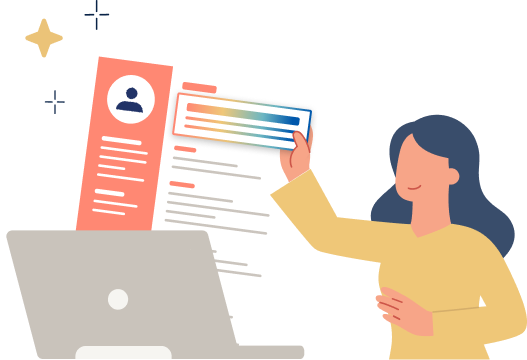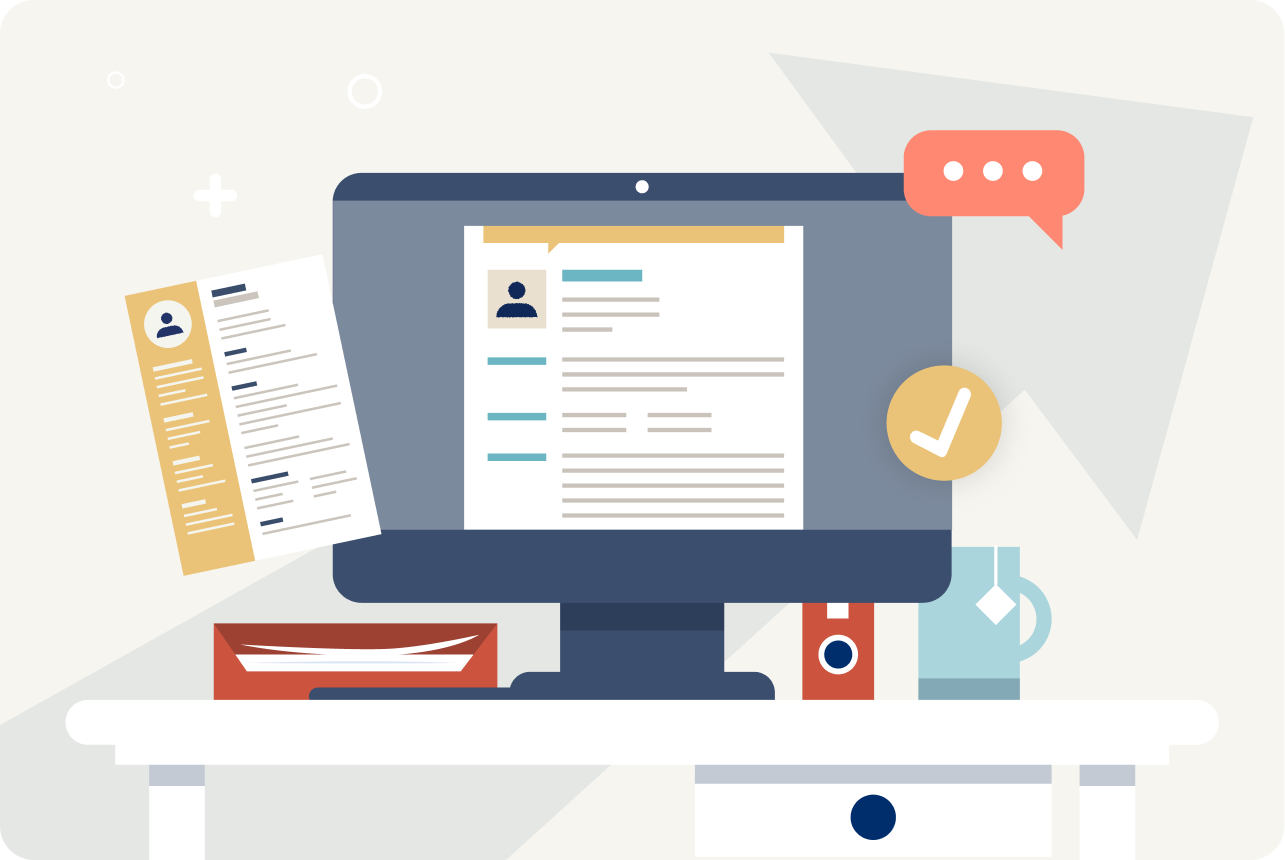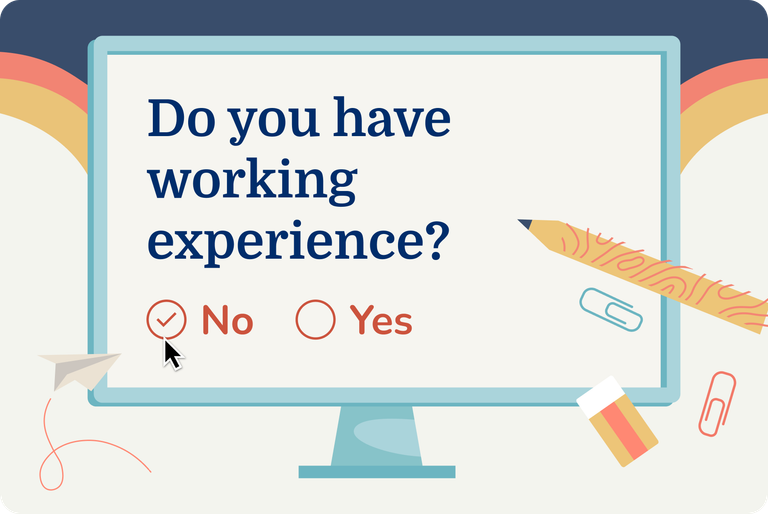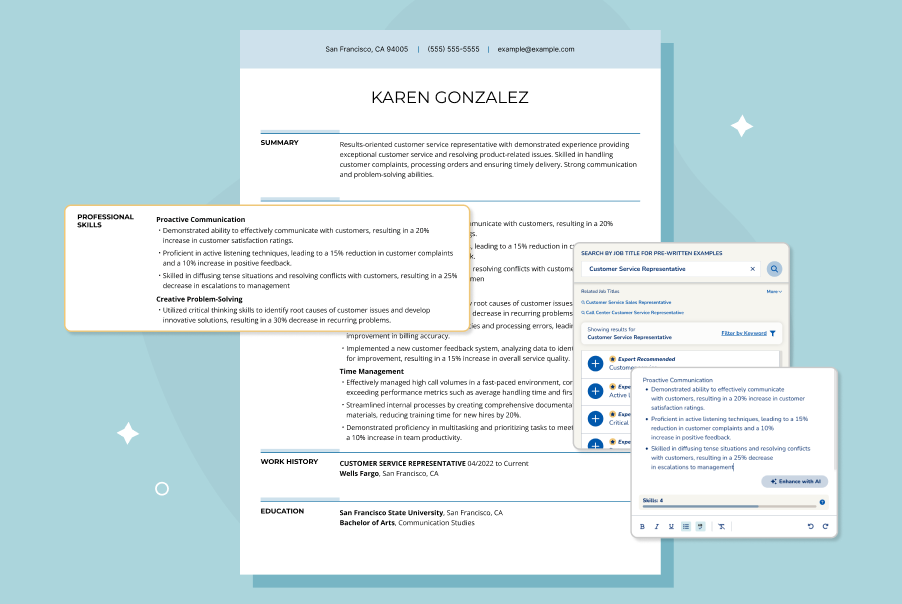Soft Skills: Definition & Examples for Your Resume

Our customers have been hired at: *Foot Note
With the rise of artificial intelligence and automation in many industries, soft skills are becoming increasingly valuable for maintaining a human-centered approach in the workplace.
In this guide, we’ll explore how to leverage your soft skills to impress potential employers and land your dream job faster.
From practical examples to professional advice on listing soft skills on your resume, you’ll find everything you need to give yourself a competitive edge in today’s job market.
What Are Soft Skills?
Soft skills are personal attributes, behaviors, and social abilities that influence how well someone interacts with others and handles work situations. Here are a few examples of soft skills:
- Communication: Clearly expressing ideas, actively listening, and understanding others
- Teamwork: Collaborating effectively with coworkers to reach shared goals
- Problem-solving: Thinking critically and creatively to overcome challenges
- Time management: Prioritizing tasks and managing deadlines efficiently
- Adaptability: Staying flexible and adjusting to changes or unexpected situations
- Leadership: Motivating and guiding others while fostering a positive environment
- Work ethic: Being dependable, dedicated, and committed to quality
Soft skills are often developed through life experiences rather than formal education, and they’re transferable across roles and industries.
Soft Skills vs Hard Skills
While soft skills are personal attributes that shape how you work and communicate, hard skills are job-specific and often learned through training, education, or hands-on experience.
For example, hard skills like coding, accounting, or data analysis show an employer that you have the knowledge and expertise to perform specific tasks required for a role.
While hard skills prove you can do the job, soft skills show how you do the job—and how well you’ll collaborate with others. In most roles, a strong combination of both is essential.
Check out the video below to learn more about the differences between soft skills and hard skills:
Video: Hard Skills and Soft Skills
Why Are Soft Skills Important?
Soft skills are essential for building strong workplace relationships, leading teams, handling feedback, and growing in your career.
Many employers prioritize soft skills just as highly as technical expertise, especially in roles that require collaboration, customer service, or leadership.
When employers review your resume, they’re looking for qualities and interpersonal skills that assure them that you will thrive on the team.
Including soft skills on your resume can set you apart from other candidates with similar technical abilities. Here are a few reasons why:
- Soft skills are transferable: Abilities like communication are transferable skills that apply across industries. For example, the customer service skills from your days as a server can help you perform during client meetings as an architect.
- Soft skills increase your productivity: Soft skills can help you be a better worker and coworker! Knowing how to collaborate, follow instructions, and resolve conflicts can make a difference in your work environment.
- Soft skills can improve your performance: Even if your technical skills are highly advanced, soft skills like adaptability and innovation can significantly boost your performance by helping you respond to challenges and find creative solutions.
Our Resume Builder provides suggestions for skills to include on your resume based on your job title and experience, simplifying the process of crafting a standout skills section.
Top Soft Skills Examples
Explore some of the most in-demand soft skills for the workplace. We included a related soft skills list for each one so that you can tailor them to the job you’re applying for.
1 Time management
Employers want to know that they can trust you to finish the job on time.
Being organized and managing your time effectively leads to higher efficiency, ensuring deadlines are met and tasks don’t pile up.
Here are a few additional soft skills related to time management:
- Dependability
- Punctuality
- Organizational skills
- Motivation
- Independence
- Self-monitoring
- Multitasking
- Following directions
- Strategic planning
- Scheduling
2 Teamwork
Great candidates can lead, but they can also take direction and support their teammates when they need to, even if you’re working remotely.
This can be a tricky soft skill to prove on a resume, but you'll stand out if you can use your past accomplishments to highlight how you’ve worked alongside others to successfully finish projects.
Here are some soft skills related to teamwork you can consider for your resume:
- Collaboration
- Networking
- Team building
- Responsibility
- Conflict management
- Leadership
- Empathy
- Diversity awareness
3 Problem-solving
Challenges are a part of any job. Problem-solving skills help you think critically, assess situations, and develop effective solutions without getting stuck.
You might have shown problem-solving skills when you had to use your industry knowledge to find a quick solution to an issue, or when you were tasked with resolving a complex challenge.
Here is a list of soft skills related to problem-solving:
- Creativity
- Research
- Analysis
- Resourcefulness
- Risk management
- Troubleshooting
- Decision-making
- Good judgment
- Quick thinking
- Teamwork
- Levelheadedness
- Initiative
4 Flexibility
Do you handle stress well? Can you easily pivot from one task to another?
Flexibility is a great soft skill to have under your belt, as it shows you can adapt to sudden changes without getting too overwhelmed.
A great way to include this soft skill in your job application is by providing an example of when you handled a sudden change of plans.
Here are some soft skills related to flexibility to consider:
- Open-mindedness
- Positive attitude
- Cooperation
- Patience
- Reliability
- Positive work ethic
- Stress management
5 Critical thinking
The ability to analyze information objectively and make reasoned judgments is essential in any role.
Strong critical thinking skills help you evaluate options, solve problems efficiently, and make informed decisions—especially in high-stakes or complex situations.
Take a look at these soft skills related to critical thinking:
- Adaptability
- Logical thinking
- Research
- Thinking outside the box
- Critical observation
- Curiosity
- Analytical thinking
- Identification
- Problem-solving
- Desire to learn
6 Communication
For many recruiters and hiring managers, communication skills are essential, and with good reason.
Communication is how we share ideas, connect, and learn from each other. This soft skill goes beyond speaking clearly.
It’s also about listening to others, being empathetic, and understanding nonverbal cues. Here are a few soft skills related to communication:
- Clarity and concision
- Active listening
- Emotional intelligence
- Respect
- Friendliness
- Negotiation
- Empathy
- Cultural awareness
- Confidence
- Public speaking
- Conflict resolution skills
- Presentation
- Nonverbal communication
- Persuasion
7 Creativity
Being a creative thinker goes beyond having an imagination.
This valuable soft skill is an excellent tool for thinking of different strategies to solve problems, developing new ideas, and even paving the way to technical skills like copywriting or painting.
A creative person looks at things from a different perspective, which might just be what an employer needs. Here are some related creativity soft skills examples to consider:
- Brainstorming
- Lateral thinking
- Mind mapping
- Visual reading
- Out-of-the-box thinking
- Problem-solving
- Experimentation
- Curiosity
- Conceptual thinking
- Imagination
8 Cultural intelligence
Being culturally intelligent means understanding, respecting, and effectively interacting with people from diverse backgrounds.
Cultural intelligence (CQ) allows you to connect with others, including clients and customers on the other side of the world.
This skill enhances communication, reduces misunderstandings, and helps create inclusive, collaborative work environments—especially in global or multicultural teams.
Here is a list of soft skills related to cultural competence:
- Cultural awareness
- Cultural sensitivity
- Cross-cultural communication
- Global mindset
- Perspective-taking
- Cultural competence
Looking for work-from-home jobs near you? Our sister company, FlexJobs, updates listings daily with verified remote jobs. Discover a variety of full-time and part-time remote jobs that allow you to work from home or anywhere in the world.
How To Include Soft Skills on Your Resume
It’s important to highlight your soft skills strategically throughout your resume. Explore the following tips on how to showcase soft skills effectively.
Include soft skills in your resume headline
Your resume headline is a short statement at the top of your resume that summarizes who you are as a candidate.
While it usually highlights your job title or area of expertise, it’s also a great place to hint at key soft skills. Here are a few examples:
- "Collaborative Marketing Specialist With a Creative Edge"
- "Detail-Oriented Project Manager Known for Strong Leadership"
- "Customer-Focused Sales Professional With Excellent Communication Skills"
- "Adaptable Administrative Assistant With a Reputation for Efficiency"
Add soft skills to your resume summary
Your resume summary or professional profile is the first section recruiters read, making it a great place to introduce key soft skills.
Choose two to three traits that align with the job you’re targeting and briefly explain how they shape your approach to work. Keep it concise and focused. For example:
"Customer-focused sales associate with strong interpersonal and communication skills, known for building lasting client relationships and consistently exceeding targets."
List soft skills in the skills section
Your resume skills section should include a mix of hard and soft skills. When adding soft skills, focus on traits that are mentioned in the job description or are highly valued in your field. Avoid generic buzzwords and instead choose terms that reflect specific, relevant strengths.
Aim to list six to 10 skills in your skills section. This allows enough space to highlight your strengths without overwhelming the reader or cluttering the layout. The placement and formatting of your skills section will depend on the resume format you choose to follow.
You can use our AI Resume Skills Generator to instantly generate a list of skills to include on your resume based on your current or target job title:
AI Resume Skills Generator

Demonstrate soft skills in your work experience
Rather than listing soft skills in isolation, show how you’ve used them in real situations by incorporating them into the work history section of your resume.
Describe your accomplishments in a way that highlights your interpersonal and problem-solving strengths. This makes your soft skills more credible and compelling to employers. For example:
Office Manager
BrightPath Consulting, August 2020 – Present
- Streamlined daily operations by improving internal communication and task delegation, increasing team efficiency by 25%.
- Fostered a positive work environment through empathy, active listening, and conflict resolution, resulting in a 30% improvement in employee satisfaction survey scores.
- Took initiative to reorganize the company’s scheduling system, reducing missed appointments by 40% and improving overall client satisfaction.
Mirror the language of the job description
To improve your resume’s chances of passing through applicant tracking system (ATS) filters, use the same language that appears in the job posting.
If the employer is looking for someone who is “collaborative” and “self-motivated,” make sure those terms show up naturally in your resume.
Use soft skills from the job listing as keywords throughout your summary, experience, and skills section. Our resume examples demonstrate how to do this effectively for various industries.
Pair soft skills with quantifiable accomplishments to show that your traits directly contribute to business success, which helps hiring managers understand the value you bring.
How to Include Soft Skills in a Cover Letter
Your cover letter is an excellent place to highlight soft skills because it allows you to tell stories, explain context, and show how your personality fits the role.
Instead of simply listing traits like “teamwork” or “communication” when writing your cover letter, focus on demonstrating them through examples. For example:
As you explain why you’re a great fit for the job, naturally integrate soft skills into your story. Mention how you approach challenges, work with others, or contribute to a team’s success.
You can use our Cover Letter Generator for professionally written content that includes key soft skills based on your experience.
How To Develop Soft Skills
Soft skills can be improved over time through practice, feedback, and self-awareness. Be flexible and consistent in learning soft skills. Here are a few tips to keep in mind:
- Identify areas for improvement: Reflect on which soft skills you’d like to strengthen, such as communication, adaptability, or leadership.
- Practice regularly: Look for everyday situations—at work, school, or in social settings—where you can apply and refine these skills.
- Seek feedback: Ask peers, mentors, or managers for constructive feedback to help you recognize your strengths and spot areas for growth.
- Take courses or attend workshops: Enroll in classes focused on soft skills training like conflict resolution, time management, or emotional intelligence.
- Observe others: Watch how effective coworkers, leaders, or role models navigate challenges and communicate, then apply those lessons.
- Volunteer or join group activities: Take part in team projects, community service, or clubs that allow you to collaborate and lead.
- Read and self-educate: Explore books, podcasts, or articles that dive into personal development and soft skill strategies.
Choose one soft skill to focus on at a time, and track your progress with real-life examples. You can request feedback from managers and colleagues every so often to determine if your effort is working as intended.
Soft Skills in Virtual and Remote Work
Technological advancements have brought flexibility to the workplace, such as work-from-anywhere jobs and hybrid roles. These are a few essential soft skills for remote employees:
- Communication: Clear communication is crucial when working remotely to avoid misunderstandings across channels like email, chat, and video calls.
- Self-motivation: Without in-person supervision, remote workers need a strong internal drive to stay focused and productive.
- Time management: The ability to prioritize tasks, manage schedules, and meet deadlines independently is key to remote success.
- Adaptability: Remote work environments can change quickly. Being flexible helps you adjust to new tools, workflows, and expectations.
- Accountability: Taking ownership of your responsibilities and consistently following through builds trust with remote teams.
- Collaboration: Even from a distance, teamwork matters. Being able to work effectively with colleagues across time zones and platforms keeps projects moving smoothly.
It’s a good idea to reassess your remote soft skills by seeking feedback from your coworkers and managers. It’ll help you become a better remote worker and allow you to update your resume with newer examples of how you’ve successfully used your soft skills in the workplace.
Integrating Soft Skills Into Personal Branding
Soft skills are a powerful way to humanize and strengthen your personal brand. Highlighting traits like communication, leadership, adaptability, or emotional intelligence helps employers see how you approach work, collaborate with others, and solve problems.
Whether you’re writing a resume, updating your LinkedIn profile, or networking, weave in examples of soft skills through stories, accomplishments, and testimonials.
Showcasing how you lead a team, handle pressure, or support colleagues adds depth to your brand—and makes you more relatable, trustworthy, and memorable.
You can use your Bold.pro networking profile to highlight soft skills by sharing key achievements, adding endorsements, and writing a compelling bio that reflects your personality and work style. This helps potential employers get a well-rounded view of who you are.
Key Takeaways
- Soft skills are intangible qualities that reflect how you work, communicate, and interact in a professional setting.
- Unlike hard skills, soft skills aren’t tied to a specific job or industry. This makes them highly transferable and valuable across a wide range of roles.
- Strong soft skills can enhance your performance, boost productivity, and prepare you for the evolving demands of the workplace.
- Your resume should feature a balanced mix of six to 10 hard and soft skills. This combination highlights both your technical abilities and interpersonal strengths.
- How you present your skills on a resume will depend on your chosen resume format. For example, a functional format emphasizes skills more heavily than a chronological one.
- A cover letter is the perfect place to expand on your soft skills. Use it to provide specific examples that show how these traits can benefit the employer.
- Soft skills can be developed through learning, self-awareness, and practice. You can take courses and ask for feedback from peers or mentors.
FAQ
What are basic soft skills?
Basic soft skills are the foundation of interpersonal abilities, those that help you interact with others and perform your job.
Basic soft skills include communication, leadership, creativity, teamwork, dependability, problem-solving, flexibility, and critical thinking.
These soft skills are transferable across different industries. Researching the role you’re seeking can help you choose the right soft skills for your resume.
Why are soft skills important in the workplace?
Soft skills are important qualities that help us work effectively with others. Here are a few examples of soft skills to put on a resume to demonstrate your workplace readiness:
- Communication: Good communication skills can help resolve conflicts and build relationships with colleagues, clients, and customers.
- Teamwork: Most jobs require you to work with others to achieve common goals. This requires good communication, collaboration, and a willingness to compromise.
- Adaptability: Workplaces are constantly changing. Adaptable individuals can more easily adjust to changes in their roles, responsibilities, and work environment.
- Problem-solving: Good problem-solving skills can also help individuals make better decisions and improve processes in the workplace.
- Leadership: Professionals with strong leadership skills can also delegate tasks effectively and provide guidance and support to their team.
Overall, soft skills are important in the workplace because they help you work effectively with others, adjust to changes, and solve problems to achieve common goals.
How can I improve my soft skills?
Soft skills can be improved with practice. Reassess your habits and relationships every so often to evaluate what needs improvement. Ask your colleagues, managers, or mentors for feedback on your soft skills. This can help you identify areas for improvement and develop an action plan.
You can find courses or workshops in your area that can help you improve specific soft skills, such as communication, time management, or leadership. Look for opportunities to practice your soft skills in your daily life, such as volunteering, joining a club or organization, or taking on leadership roles in your community.
Strengthening cognitive skills, such as attention, memory, perception, and processing, can also help improve essential soft skills. Remember, improving your soft skills takes time and effort, but it can greatly enhance your career prospects and help you succeed in the workplace.
How can I show my soft skills during a job interview?
In your resume and cover letter, you showed soft skills through examples of your work accomplishments. During a job interview, you’ll have the chance to expand on how you achieved these accomplishments.
Use clear and concise language when answering behavioral interview questions, and provide examples of how you have communicated effectively with colleagues, clients, or customers.
Highlight your experience working in teams and provide examples of how you have contributed to a team’s success. Discuss any challenges you faced while working in a team and how you overcame them.
The key to demonstrating your soft skills during a job interview is to provide specific examples of how you have used them in your previous work experiences. Our interview prep tools can help you practice your answers to common questions.
Do applicant tracking systems scan for soft skills?
Applicant tracking systems (ATS) are designed to scan for specific keywords on your resume and qualifications that match the job requirements. Many ATS programs do scan for soft skills, especially when they’re mentioned in the job description.
While ATS tools are often primarily designed to detect keywords related to hard skills, qualifications, and experience, they can also look for soft skills when employers include them as part of the screening criteria.
For example, if a job listing mentions “strong communication skills” or “team player,” the ATS may scan resumes for those same phrases. Including relevant soft skills—worded similarly to the job description—can help you create an ATS-friendly resume that ranks higher in the system.
How we reviewed this article
Since 2012, we have helped more than 11 million job seekers. We want to make your career journey accessible and manageable through our services and Career Center’s how-to guides and tips. In our commitment to bring you a transparent process, we present our Editorial Process.
Our customers have been hired at:*Foot Note









